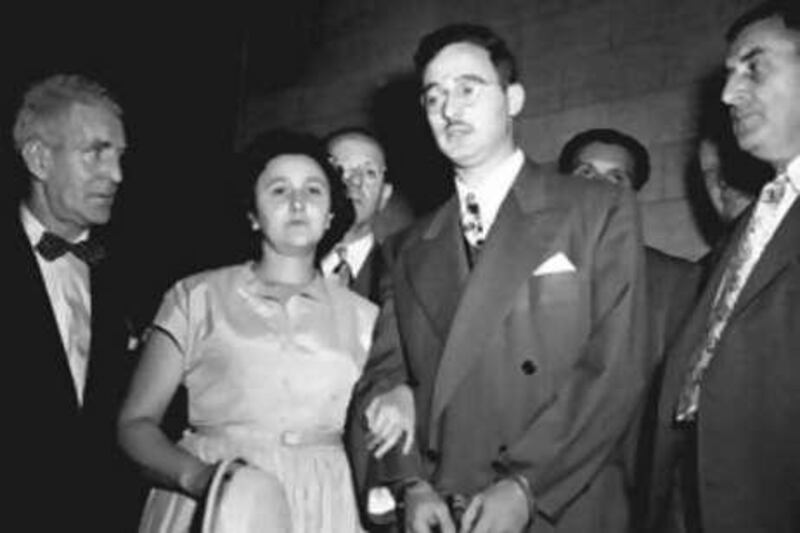NEW YORK // Historians and freedom of information advocates are eagerly awaiting the release of sealed testimony this year in the case of Julius and Ethel Rosenberg, executed 55 years ago as Soviet spies. Their case remains as alive as ever in the popular consciousness - novels, nonfiction books, plays and documentaries are still produced - partly because of many unanswered questions surrounding the couple's trial and convictions.
The US government to the surprise of many agreed last month to make public some of the secret testimony in what was called the biggest spy case of the Cold War. The government agreed that grand jury testimony given by 35 of 45 witnesses could be made public because of the great historical and public interest in the Rosenbergs. The 35 are either dead or gave consent to have their testimony made public. The 10 remaining witnesses are either alive and refused to give consent or could not be found.
In the US system, grand juries meet in secret to determine whether there is enough evidence to bring charges in a trial. Evidence is released in only very exceptional cases. This month a judge is to hold another hearing to determine whether the remaining testimony should be made available. Resolving this dispute could take months. "We hope to win even though the presumption against opening grand jury records is very strong," said David Vladeck, a Georgetown University professor, who led a petition for a group that includes historians and the National Security Archive, which is an independent organisation that presses for release of government information.
The Rosenbergs' ordeal started in 1945 when a Soviet code clerk defected to the West and helped expose a wide-reaching espionage operation by Soviet Union against the United States. The couple were executed in the electric chair of New York's Sing Sing prison on June 19 1953. "Many witnesses gave grand jury testimony, but only three were called to trial," Mr Vladeck said. "So there's tremendous interest in why the government didn't call the others."
This left the question whether there was further evidence that would confirm the convictions or clear the couple. "The degree of explicit guilt is contested terrain," said Thomas Blanton, director of the National Security Archive, which uses the Freedom of Information Act to unearth government secrets. "Without the primary sources, the scholarship descends to a polemical debate. Historians of every opinion have been looking for new evidence since the time of the convictions and it's an area of huge controversy."
In particular, the evidence against Ethel Rosenberg appears weak. Records released by the Russians in the 1990s indicated Julius was involved is some kind of espionage but not Ethel. "The grand jury records will likely clarify the government's prosecutorial strategy against Ethel Rosenberg," said Ellen Schrecker, a history professor at New York's Yeshiva University, in a declaration to support the petition.
"While Ethel was probably aware of her husband's espionage activities, the government had no evidence that she was directly involved with espionage. [In] order to pressure Julius Rosenberg to confess, the government prosecuted his wife and threatened her with the death penalty." Her conviction hinged on the testimony of her brother, David Greenglass, whom the couple is alleged to have recruited while he worked at the site of the first atom bomb test in New Mexico.
Mr Greenglass escaped execution in return for his testimony and served 10 years in prison. Released in 1960 and living under an assumed name, he said in recent years that he lied about seeing his sister transcribing spy notes on a typewriter. He is one of the witnesses who declined consent to release his testimony although lawyers will argue that he waived his privilege by giving interviews about the case. "His evidence is pivotal and we will fight to get his testimony released," Mr Vladeck said.
Historians also hope to learn more about whether Julius Rosenberg passed on secrets relating to nuclear weapons - for which he was convicted - or about conventional, if innovative, munitions. "There is huge speculation over what Julius and his crew were up to. If the evidence points to conventional weapons, then the US government at the time was guilty of one of the worst counter-espionage failures as some of these arms were used in North Korea and Vietnam," Mr Vladeck said.
"Or perhaps the case was limited to nuclear weapons to avoid embarrassment or because it was more sensational and easier to get convictions. There are a lot of unanswered questions." Robert Meeropol, one of the Rosenbergs' two sons, was six when they were executed. In a speech two years ago, he drew a parallel that put his parents' deaths in context of both the Cold War and present-day concerns. In the Cold War, he said, people feared the atomic bomb and communists. "Now, they're taking the thing the public fears most - weapons of mass destruction - and linking it to the people the public fears most - Islamic fundamentalists," he said.
sdevi@thenational.ae






